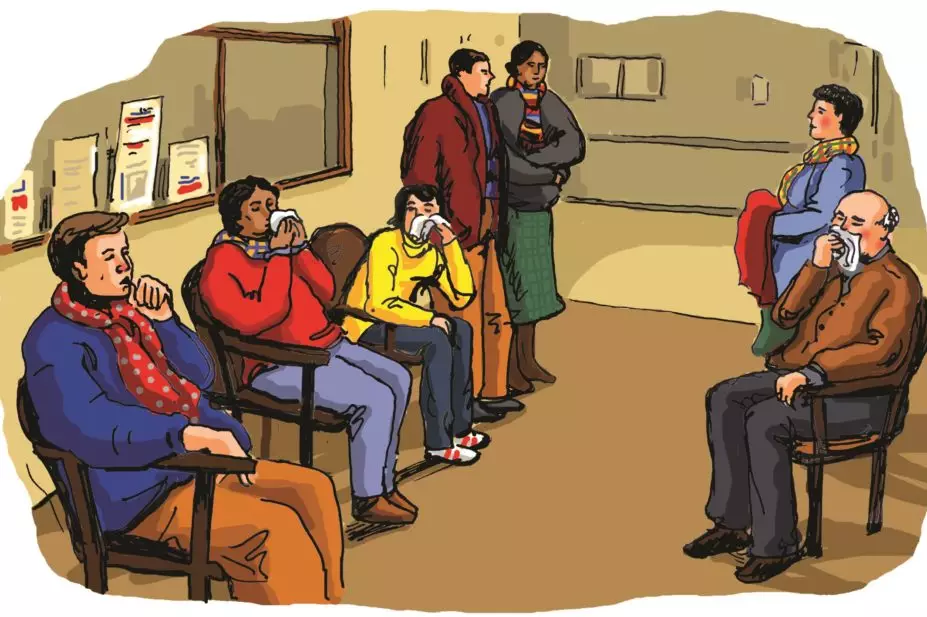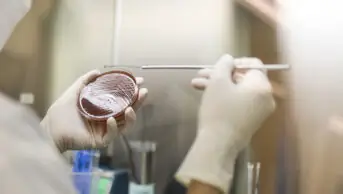
Callie Jones
Antimicrobial resistance (AMR) continues to be a growing threat to public health worldwide. It is the responsibility of all healthcare professionals to address the misuse of antibiotics. And yet GPs in the UK are ever more likely to prescribe antibiotics for coughs and colds, sore throat, coughs and otitis media; indeed between 1999 and 2011, GPs were 40% more likely to do so[1]
. Community pharmacists should take advantage of their accessibility to patients in the community by advising patients not to request antibiotics from their GPs for such self-limiting infections and help play their part in a concerted effort to reduce the rise of antibiotic resistance.
The problem
The proportion of cough and cold episodes for which antibiotics were prescribed decreased from 47% in 1995 to 36% in 1999, but increased to 51% in 2011. This is despite UK government recommendations to reduce prescribing for illnesses largely caused by viruses. A survey of 1,000 doctors by doctors.net completed as part of the ‘Treat yourself better with pharmacist advice’ campaign, which is now in its second year, revealed that more than a quarter of GP consultations in the winter months are for colds, for which antibiotics are ineffective. Five out of six GPs say they feel pressured to prescribe an antibiotic when it is not necessary. The research also revealed that, on average, five hours a week are spent seeing patients who could have been treated by a pharmacist[2]
. Unnecessary visits to GPs and A&E currently cost the NHS £2bn each year.
Although antimicrobial resistance cannot be eradicated, joint efforts by all healthcare professionals and members of the public can help limit its threat and minimise its impact on health. The UK five-year antimicrobial resistance (AMR) strategy is the joint human and animal health government strategy which sets out actions to slow the development and spread of antimicrobial resistance with a focus on antibiotics. One such effort is the the annual European Antibiotics Awareness Day (EAAD) on 18 November 2014.
In 2014, Public Health England — in collaboration with the Department of Health, NHS England, Department for Environment, Food and Rural Affairs and several pharmacy bodies such as the Royal Pharmaceutical Society, Pharmacy Voice, and the Centre for Postgraduate Pharmacy Education — has launched the Antibiotic Guardian Pledge Campaign to increase action in the UK. We are asking the medical community and the public to become antibiotic guardians and for everyone to ask themselves how they will make better use of antibiotics and help save this vital medicine from becoming obsolete.
Educating patients
For pharmacists to be able to help the public manage their self-limiting illnesses effectively, it is important that they are aware of the likely duration of these illnesses, which can often be much longer than five days. For example, cough or bronchitis can last up to 21 days; sinusitis — 18 days; common cold — 10 days; sore throat — 7 days.
Pharmacists should remain vigilant to identify red flags such as persistent raised temperature (39°C and above) for longer than three days, severe headache with vomiting or severe earache, or coughing blood or blood stained mucus on more than one occasion. Ill patients should be advised to drink plenty of fluids, get plenty of rest, and avoid smoking and second-hand smoke.
Further information is available through the Pharmacy Self Care Advice pathways (led by Pharmacy Voice and the Proprietary Association of Great Britain and leaflets for healthcare professionals to share with patients via the TARGET antibiotics toolkit (led by Public Health England).
When talking about minor illnesses to patients, community pharmacists should convey the same information given by GPs (through TARGET and Self Care Forum) to ensure patients receive consistent advice and provision of treatment options. Consistency could be ensured by providing information to members of the public via the ‘Treat yourself better with pharmacist advice’ and antibiotic guardian campaigns.
Helping to increase the uptake of flu vaccination across the UK — either by providing flu vaccine service or signposting at-risk patients — is another way that community pharmacy contributes to the reduction of inappropriate use of antibiotics for flu symptoms.
Challenges to overcome
Not all members of the public recognise community pharmacy as the first port of call when they are suffering from a cough, cold or sore throat.
In addition, when patients are unable to afford over-the-counter medicines to manage their symptoms and self care, they visit their GP, A&E or out-of-hours providers to request a prescription for antibiotics. NHS England, in its 2013 report, includes minor ailments services commissioned through community pharmacy as one of the three services for commissioners to consider to help with winter pressures[3]
.
Educating all pharmacy staff on the risks of AMR and their role in helping to reduce AMR is essential. Training of pharmacy counter assistants using programmes such as CPPE’s antibacterials floor on www.thelearningpharmacy.com would be valuable.
Community pharmacists can make a big impact in helping to reduce AMR[4]
. They are invited to become antibiotic guardians and should encourage colleagues, members of the public and patients to do the same and act now to halt the spread of antimicrobial resistance.
Diane Ashiru-Oredope is pharmacist lead for Public Health England.
Taking action
- Make a pledge at www.antibioticguardian.com and encourage colleagues and staff to pledge;
- Promote the antibiotic guardian campaign within the pharmacy and encourage customers to consider making a pledge;
- Actively promote antibiotic awareness within your store this winter. Posters, leaflets, quizzes and videos to educate the public and other pharmacy staff and healthcare professionals are available via www.antibioticguardian.com;
- Take the special edition of the CPPE e-challenge on antimicrobial stewardship which will be published on 12 November 2014;
- Complete a continuing professional development on antibiotics and antibiotic resistance;
- Attend a joint Public Health England and CPPE training session at the Pharmacy Show in October 2014;
- Promote prudent use of antibiotics all year round and consider another day or week to carry out a local campaign during the winter months;
- Provide information on any outcomes of your activity to Diane Ashiru-Oredope, PHE pharmacist lead, (email diane.ashiru-oredope@phe.gov.uk) for inclusion in the evaluation report of EAAD 2014 activities.
References
[1] Hawker JI, Smith S, Smith GE, et al. Trends in antibiotic prescribing in primary care for clinical syndromes subject to national recommendations to reduce antibiotic resistance, UK 1995–2011: analysis of a large database of primary care consultations.Journal of Antimicrobial Chemotherapy 2014. doi:10.1093/jac/dku291.
[2] NHS England. Community Pharmacy — helping with winter pressures. 2013.
[3] NHS England. Community Pharmacies — helping with winter pressures: three services for commissioners to consider. 2013.
[4] Howard P et al. Time for pharmacy to unite in the fight against antimicrobial resistance. The Pharmaceutical Journal 2013;291:537.


